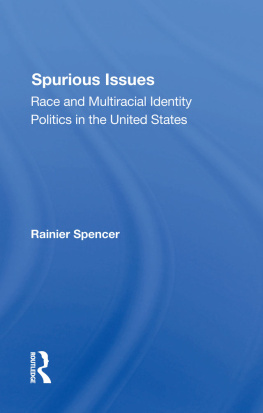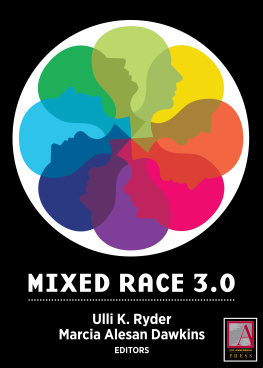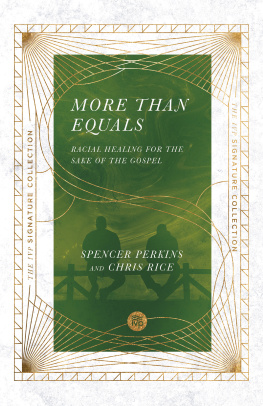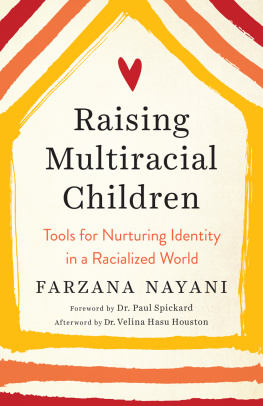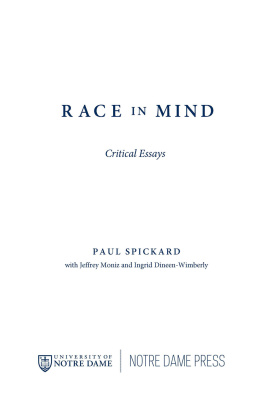First published 1999 by Westview Press
Published 2019 by Routledge
52 Vanderbilt Avenue, New York, NY 10017
2 Park Square, Milton Park, Abingdon, Oxon OX14 4RN
Routledge is an imprint of the Taylor & Francis Group, an informa business
Copyright 1999 Taylor & Francis
All rights reserved. No part of this book may be reprinted or reproduced or utilised in any form or by any electronic, mechanical, or other means, now known or hereafter invented, including photocopying and recording, or in any information storage or retrieval system, without permission in writing from the publishers.
Notice:
Product or corporate names may be trademarks or registered trademarks, and are used only for identification and explanation without intent to infringe.
Library of Congress Cataloging-in-Publication Data
Spencer, Rainier.
Spurious issues: race and multiracial identity politics in the United States / Rainier Spencer.
p. cm.
Includes bibliographical references and index.
ISBN 0-8133-3677-5
1. United StatesRace relationsGovernment policy. 2. Racially mixed peopleUnited StatesRace identity. 3. Categorization (Psychology). 4. RaceSocial aspectsUnited States. Title.
E184.A1S73 1999
305.8'04073dc21
99-24420
CIP
ISBN 13: 978-0-367-28857-0 (hbk)
It is a difficult thing to separate oneself from one's work, and it is difficult also to separate the people and experiences that have contributed to who one is from the people and experiences that have contributed directly and indirectly to the work one does. Recognizing this, I shall nonetheless make the attempt to acknowledge those persons who have been especially important to me in my writing this book.
Happily, though, the question of where to begin presents no problem. The most important people in my life have been two women whose assistance and guidance have been so fundamental that I literally cannot imagine having arrived where I am without them. The first is my wife, Jackie, without whose help and support I would not have even entered the realm of scholarly pursuits. Her sacrifices, and those of our daughter, Nicole, especially during the difficult and trying doctoral program years, represent a debt I can only hope to one day repay.
The single most important person in my professional life has been my teacher, mentor, adviser, critic, and good friend Patricia Penn-Hilden. Through her personal example and the scholarly rigor she demands in her work as well as in the work of others, and by showing more genuine care and concern for students than any other professor I have ever known, she has opened for me a vast array of intellectual doors whose existence I had not even imagined. In terms of the manuscript itself, it was Pat who unfailingly and mercilessly sent me back to the drawing board time and time again when the present book existed as a dissertation-in-progress. Her persistence was the best thing that could have happened to me, though, and my writing has benefited immensely from her attention and consideration. She also graciously provided reviews as the project moved toward finally becoming a proper book manuscript. Both Pat and her husband, Timothy Reiss, hold a special place in my heart for all they have been to me.
Certainly, I owe a great debt to Emory University, especially to its Graduate Institute of the Liberal Arts. I did the vast majority of my library research, particularly relating to government documents, at Emory's Robert W. Woodruff Library. I want to especially recognize the very fine government documents section there and to personally thank the library's excellent and indomitable interlibrary loan staff, particularly Marie Hansen.
I received indispensable assistance from the federal government as well. From mailing me copies of contemporary and archival documents to providing current updates of assorted policies, various federal offices proved to be invaluable resources. The Library of the Executive Office of the President saved me on more than one occasion when I was in need of obscure government publications that I could not find elsewhere. For special praise I must single out Suzann Evinger of the Statistical Policy Office of the Office of Management and Budget's Office of Information and Regulatory Affairs. She put up with frequent telephone calls from me and was always obliging with her very valuable time. Although her office was in the midst of dealing with potential revisions to federal racial classification, and my constant requests were surely a distraction for her, she nonetheless kindly provided me with information and references to other sources that were of immense help to me.
I would be remiss if I did not give humble thanks to Ramona Douglass, president of the Association of MultiEthnic Americans, for her generosity in sharing with me many of the details regarding the negotiations and inner workings of the move to add a multiracial category to the federal scheme. Although we remain apart philosophically on some of our positions regarding the idea of multiraciality, I continue to have only the utmost respect and the highest admiration for her both personally and professionally.
There are several individuals whose work and friendship have been especially helpful as I pursued this project. The idea for this book originated out of my reading an excellent essay by Cynthia Nakashima that inspired me to take the path I did. Two colleagues of Cynthia's, Becky King and Kim DaCosta, who have also become dear friends of mine, offered ideas, criticism, and friendship through conversation, correspondence, and the happy (though all too few) occasions of appearing on conference panels together. Another friend, Lise Funderburg, has done a great deal to inspire me with her calm precision and objectivity. And Aubyn Fulton never backed down from a logical challenge, forcing me, via his pointed and relentless dialectic, to constantly rethink and restate my arguments in the best ways possible.
I want to thank my colleagues in the Department of Anthropology and Ethnic Studies of the University of Nevada, Las Vegas, for their encouragement and support as I completed this book. I am indebted as well to the staffs of the interlibrary loan office, especially Victoria Hart, and the faculty copy service of UNLV's James R. Dickinson Library for their invaluable assistance.
Thanks also to Mari Shullaw, who reviewed and commented upon an early version of the manuscript. Thanks especially to Karl Yambert of Westview Press for his support and confidence. The task of writing is rendered so much easier when one knows one is in good hands. Those hands also include Jennifer Chen, Lisa Wigutoff, Michelle Trader, and Cathleen Tetro of Westview. I want to explicitly acknowledge the invaluable contribution of Norman Ware, whose copyediting of the manuscript was simply superb.
Finally, while recognizing the important assistance of the individuals named above, I take full responsibility for the contents of this book and for any factual errors or technical mistakes contained herein.
Rainier Spencer

